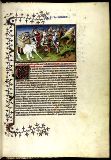Marco Polo was a Venetian trader and
explorer who gained fame for his worldwide travels, recorded in the book
II Milione ("The Million" or The Travels of Marco Polo).
Marco Polo (1254-1324), is probably the most famous Westerner traveled
on the Silk Road. He excelled all the other travelers in his
determination, his writing, and his influence. His journey through Asia
lasted 24 years. He reached further than any of his predecessors, beyond
Mongolia to China. He became a confidant of Kublai Khan (1214-1294). He
traveled the whole of China and returned to tell the tale, which became
the greatest travelogue.
| |
|
 |
|
| |
|
Marco Polo was only 6 years old when his father and uncle set out
eastward on their first trip to Cathay (China). He was by then 15 years
old when his father and his uncle returned to Venice and his mother had
already passed away. He remained in Venice with his father and uncle for
two more years and then three of them embarked the most couragous
journey to Cathay the second time.
At the end of year 1271, receiving letters and valuable gifts for the
Great Khan from the new Pope Tedaldo (Gregory x), the Polos once more
set out from Venice on their journey to the east. They took with them
17-year-old Marco Polo. They passed through Armenia, Persia, and
Afghanistan, over the Pamirs, and all along the Silk Road to China.
Avoiding to travel the same route the Polos did 10 years ago, they made
a wide swing to the north, first arriving to the southern Caucasus and
the kingdom of Georgia. Then they journeyed along the regions parallel
to the western shores of the Caspian Sea, reaching Tabriz and made their
way south to Hormuz on the Persian Gulf. They intended to take sea route
to the Chinese port.
About Silk Road
During the 6-14th century, there were thousands of large and small
routes that crossed Asian Continent leading to the West. Caravans
followed these routes and each was filled with exotic clothes, eastern
goods and spices. These routes raised the Great Silk Road. Along Great
Silk Road towns, cities and caravanserai were created. Hence the various
centers for national crafts, art schools, madrasahs, palaces and
mausoleums. Traders, missionaries and refuges were travelling together
bringing along new religions, customs, products like glass, porcelain,
soap and gunpowder and most important a different culture.
They were the ones who created herbariums, collected methods of curing
diseases and studied the stars. In many ways, for more than thousands of
years Great Silk Road linked many countries and its people by means of
peaceful activities such as trade, culture and spiritual exchanges that
is unique to all mankind. The Great Silk Road routes started from a town called Lanchjou and
stretched to cities of Tor and Sodom, both Mediterranean ports which
acted as a junction between the East and West. This old East-West
trading trail transplanted culture, customs and religious from one
center to the next and vice-versa. Again, the Great Silk Road will be
re-opened to tourists, magnificent architectural monuments, unique works
of calligraphy, silks, rugs and pottery produced by ancient craftsmen in
our fascinating tours.
Story of Silk Road is fascinating and full of military conquest,
fearless explorers, religious pilgrims and great thinkers, along with
the humble tradesmen who risked life and limb for profit as they led
their loaded caravans across dangerous deserts, mountains and steppes.
In the history of Great Silk Road there are such figures as Alexander
the Great, Marco Polo, Genghis Khan and Tamerlane were all familiar with
Silk Road which was established by 100DC. It lasted until 15th century
when newly-discovered sea routes to Asia opened up. |